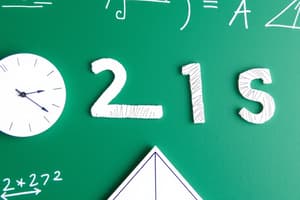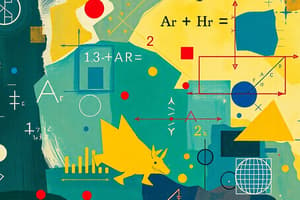Podcast
Questions and Answers
What is algebra?
What is algebra?
- It is a form of calculus.
- It is the study of geometry.
- It is a branch of mathematics concerning the study of structure, relation, and quantity. (correct)
- It only deals with numbers.
What is an algebraic equation?
What is an algebraic equation?
An equation involving only algebraic expressions in the unknowns.
What is a linear equation?
What is a linear equation?
An algebraic equation of degree one.
What is a polynomial equation?
What is a polynomial equation?
What is a transcendental equation?
What is a transcendental equation?
What is a functional equation?
What is a functional equation?
What is a differential equation?
What is a differential equation?
What is an integral equation?
What is an integral equation?
What is a Diophantine equation?
What is a Diophantine equation?
What are polynomials?
What are polynomials?
What are variables?
What are variables?
What is the purpose of using variables?
What is the purpose of using variables?
What are expressions in algebra?
What are expressions in algebra?
How is addition written?
How is addition written?
What is the commutative law of addition?
What is the commutative law of addition?
What is the associative law of addition?
What is the associative law of addition?
What is the identity element of addition?
What is the identity element of addition?
What is the inverse operation of addition?
What is the inverse operation of addition?
What is pure mathematics?
What is pure mathematics?
What is elementary algebra?
What is elementary algebra?
Match the following categories of algebra with their definitions:
Match the following categories of algebra with their definitions:
Flashcards are hidden until you start studying
Study Notes
Algebra Overview
- Algebra is a major branch of mathematics that explores structure, relation, and quantity.
- It involves operations with numbers, variables, and polynomials, including their factorization and roots.
- Key operations are addition and multiplication, forming structures known as groups, rings, and fields.
Types of Equations
- Algebraic Equation: An equation with algebraic expressions, classified by degree.
- Linear Equation: An algebraic equation of degree one.
- Polynomial Equation: An equation where a polynomial is set equal to another polynomial.
- Transcendental Equation: Involves transcendental functions of variables.
- Functional Equation: Unknowns are functions instead of numbers.
- Differential Equation: Involves derivatives, typically relating to rates of change.
- Integral Equation: Involves integrals, often used in calculus.
- Diophantine Equation: Requires solutions to be integers.
Fundamental Concepts
- Polynomials: Expressions that involve variables raised to whole number powers.
- Variables: Symbols denoting numbers, used for generalization in mathematics.
- Pure Mathematics: Algebra, along with geometry, analysis, topology, combinatorics, and number theory, represents a key area of mathematics.
Algebra Categories
- Elementary Algebra: Introduces concepts of variables and basic arithmetic operations.
- Abstract Algebra: Focuses on algebraic structures like groups and rings through axiomatic definitions.
- Linear Algebra: Studies vector spaces and matrices.
- Universal Algebra: Investigates properties common to all algebraic structures.
- Algebraic Number Theory: Examines number properties using algebraic systems.
- Algebraic Geometry: Applies abstract algebra techniques to geometric problems.
- Algebraic Combinatorics: Utilizes algebraic methods to solve combinatorial questions.
Key Operations
- Expressions: Combinations of numbers, variables, and operations, typically formatted with higher-power terms on the left.
- Addition: Represented as ( a + b ).
- Commutative Law: ( a + b = b + a ).
- Associative Law: ( (a + b) + c = a + (b + c) ).
- Identity Element: The number 0, since ( a + 0 = a ).
- Inverse Operation: Subtraction (-) serves as the inverse of addition.
Importance of Variables
- Variables enable the abstraction needed for mathematical generalization, allowing for broader applications and solutions across contexts.
Studying That Suits You
Use AI to generate personalized quizzes and flashcards to suit your learning preferences.




